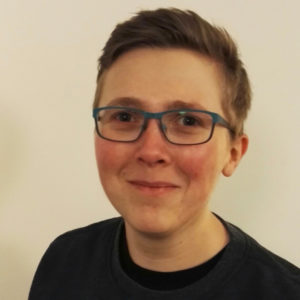LGBTQ+ STEM Day
The international day of LGBTQ+ people in STEM was held on the 18th November and celebrated around the world. Here at Exeter, we were involved in a range of activities including a PRISM Speakers Event, the GW4 Diversity in Physics Conference, and an interview with TEC girls.
PRISM Exeter Online Speakers Event
PRISM Exeter, a regional network for LGBTQ+ identifying STEMM professionals and students and their allies, held the latest event in their “PRISM Speakers” series on November 17th to coincide with LGBTQ+ STEM Day. This series aims to celebrate and champion the contributions of LGBTQ+ individuals to STEMM fields and to provide a platform for discussions regarding wider STEMM diversity and inclusion work.
At this event, Professor Robert Appleby spoke about the Tactile Collider project and communicating science to visually impaired audiences, and Dr Natasha Stephen spoke about some of her experiences as a Bisexual scientist, her research, and her work with TIGERS (The Inclusion Group for Equity in Research in STEM).
The event was held online due to government restrictions and enjoyed a peak audience of 44 connections via Zoom with participants joining from Exeter (45%), the South West of England (20%), and elsewhere, including overseas (15%). Attendees very much enjoyed the event with one attendee telling us:
“…we heard from two excellent speakers who are working to improve inclusivity in STEM through outreach activities and by taking action to level the playing field. It was also a safe and supportive space for the LGBTQ+ community and supporters to network. For my part, I came away with a better understanding of some of the barriers and challenges faced.”
Recordings of the talks are available on PRISM Exeter’s YouTube channel.
GW4 Diversity in Physics Conference
Physics departments from the GW4 network joined together on the 18th November to mark LGBTQ+ STEM day with a 1-day online conference on Diversity in Physics. Led by Cardiff with help from Physics inclusivity groups from Bath, Bristol and Exeter, the programme tackled a range of diversity issues relating to the Physics and Astronomy community and attracted nearly 100 attendees from across the UK.
Opening with a keynote presentation by Professor Peter Coles on being a Gay physicist, the day proceeded to consider issues in academic culture, open-access science and colonialism in the teaching curriculum. In the last session on harassment and wellbeing, Beth Pitcher (EDI advisor at Exeter) outlined the mechanisms we use at Exeter to support our staff and students who are experiencing dignity and respect issues.
Attendees at the event, including some members from our Physics Inclusion Working Group, found the presentations and ensuing discussion to be thought-provoking with one attendee saying:
“The conference explored toxic academic culture and was applicable to tackling all areas of equality including race, disability, gender, and lad culture, moving beyond Project Juno*.”
TECgirls interview
Dr Claire Davies (an astrophysicist and research fellow at Exeter and founder of PRISM Exeter) gave an inspiring interview with TECgirls. TECgirls aims to encourage young girls to engage with technology, engineering, and creative activities in and around Cornwall.
In her interview, Claire talked about her research in star and planetary formation and her inclusivity work that focusses on scientists who are female and who are LGBTQ+. You can read the full interview on the TECgirls website.

